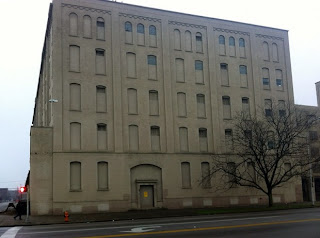
I've written several articles about how I think we could revitalize west Louisville. You can read some of my past post
here,
here, here, and
here. I wrote most of those blog post in 2009 so I think it might be time for update.
I know the city is broke and we can't invest a ton of money, but like most revitalization efforts it will take some investment. The city has realized this and Mayor Fischer has set aside $500,000 to assemble land in west Louisville for "development" I say development in quotation marks because I'm afraid it will be just another way to build a suburban style warehousing project in west Louisville. A project that wil detract from the urban nature of west Louisville and provide nothing but low income jobs. While jobs are a good thing you need more than just dead-end jobs. Where's the plan for the overall development of west Louisville?
I've spoken to enough folks in GLI to know that they basically view west Louisville as a great place for warehouses, light industry, and manufacturing. They very rarely mention anything about local mom and pop businesses, corner retail, and the types of small businesses you see up and down Bardstown Rd, East Market St, and Frankfort Ave. Those are the types of businesses we need. We have to build a strong urban fabric.
What we need in west Louisville is plan. We can have light industry and warehousing, but we also need the type of retail and commercial density found on Bardstown Rd and East Market. Like I said, I've written about economic development before. When I do I like to break my ideas into 3 parts. Things you can do in the near term (1-5 years), mid-term (5-10 years) and long term (10-20 years). I'm a firm believer that you have to look into the future and see where theres are going so you can get ahead of the curve. If you build a economic development plan on things are now, or what you did 100 years ago you are bound to fail. Louisville is still trying to be the city it was 20-100 years ago. We want to be the logistics hub and manufacturing center of the mid south. Now we are trying to be the bio-med capital of the mid south. That's great and all, but most manufacturing is done in China and Mexico. Logistics is great if you want a ton of jobs that pay on average $9-11 an hour. You can't build a vibrant economy if most of your population is below the poverty line. Bio-med is also great and can build great wealth. But that wealth is concentrated in the hands of a few scientist and medical investors. You also need a top notch research university to attract, keep, and foster bio-med. UL is a great university, but it can;t compete with the established heavyweights. At least not with the funding it gets from the state of Kentucky.
My ideas are also interconnected. One builds off of another. If you just did one without the other I think you can still have a tremendous impact on west Louisville, however, if done as a whole it would be a game changer. So, here's my plan:
To keep this post from becoming a book I'm going break it up into several parts and try be as concise as possible.
1) Micro-lending. Instead of spending $500, 000 to buy land to give to a developer to build another suburban style warehouse why not put that money into a micro-lending program to start small businesses, re-hab foreclosed/abandoned properties, or for home-owners to improve their properties.
The problems most businesses face in getting started is funding. A lot of businesses could use a small infusion of cash to get started. A micro-lending program that gave loans from $1000-5000 would do the trick. Of course you wouldn't just loan everybody the money. The soon-to-be business owners would have to go through classes on how to run a business and the program could even provide mentors for the businesses once they are started. If the city didn't want to run such a program they could set aside the money for a public private partnership with companies like
Community Venture Corporation.
I also talked about giving the money to re-hab foreclosed/abandoned properties and like. More on that later.
2) Bring back the forgivable second mortgage. If you are going to have businesses in west Louisville then you are going to need people that have disposable income. You also need to stabilize neighborhoods. Building nothing but new Section 8 housing in west Louisville is not going to stabilize it. You need middle income folks with middle class incomes to do that. Bringing back the $20,000 forgivable second mortgage is a way to entice people to move to west Louisville. However, there needs to be changes made to the program. In the past you had to have a new home to qualify. The new program has to be for new homes or old homes as well. If you can buy an existing home and re-hab it you should qualify as well. We need to keep as much of the old housing stock as possible.
Stay tuned for part 2
 What's the big deal about Michigan's RIght to Work bill that passed yesterday?
What's the big deal about Michigan's RIght to Work bill that passed yesterday?





